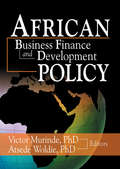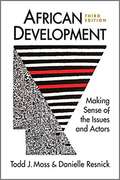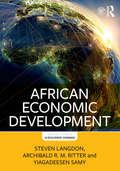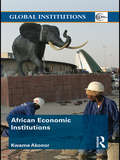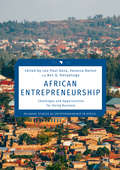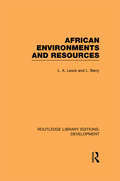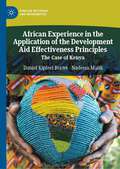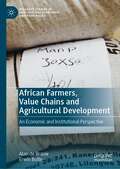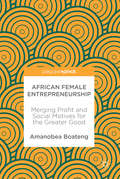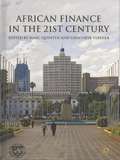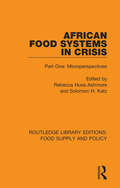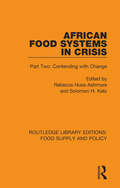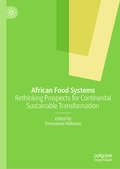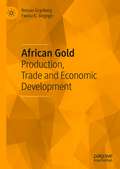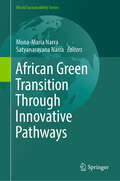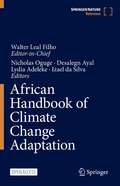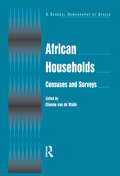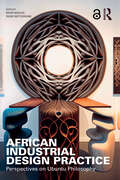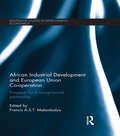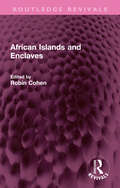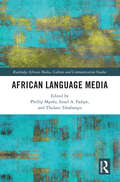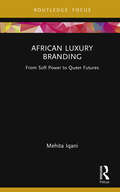- Table View
- List View
African Department: Wage Policy and Fiscal Sustainability in Benin
by Charlotte LundgrenFinancial report from the IMF
African Development Finance and Business Finance Policy
by Atsede Woldie Victor MurindeFinancial plans that stimulate growth and eliminate poverty in developing African countries! African Developmental Finance and Business Finance Policy presents theoretical/conceptual and empirical articles that provide invaluable insights into successful business techniques and strategies for the African business arena-the last great frontier of international business expansion. Researchers and practitioners in the field of developmental finance discuss the design and implementation of financial policies for pro-poor growth and poverty alienation in developing countries, including Kenya, Zambia, Nigeria, Mauritius, and Zimbabwe. The book focuses on banking, business finance, and investment, detailing strategies for coping with a small financial system, bank licensing policies, correction action rules, quality of banking services, and the revitalization of the African stock exchange. African Developmental Finance and Business Finance Policy features papers presented on key policy issues addressed at the April 2001 international conference of the Institute for Developmental Policy and Management at the University of Manchester in England. Topics addressed include: financial regulation, interest rates bank ownership regulatory forbearance emerging stock markets determinants of capital structure financial reform and much more! Targeted to policymakers in government and international agencies, academics, consultants, and executives, African Developmental Finance and Business Finance Policy is an essential resource for advancing and communicating research on developmental policy in developing countries.
African Development: Making Sense Of The Issues And Actors
by Danielle Resnick Todd J. MossBoth authoritative and accessible, African Development introduces the issues, actors, and institutions at play in development trajectories across sub-Saharan Africa. This new edition, thoroughly updated, includes an entirely new chapter devoted to key demographic trends in the region, especially rapid urbanization and the distinct “youth bulge.” There is also a review of major democratic gains and disappointments since 2011; analysis of renewed internal armed conflicts; and attention to the contemporary sovereign debt crisis relative to the structural adjustment debt of earlier decades. The book uniquely brings to life the collective impact of history, economics, and politics on development in the region.
African Economic Development (Routledge Textbooks in Development Economics)
by Yiagadeesen Samy Steven Langdon Archibald R.M. RitterSub-Saharan Africa is at a turning point. The barriers to economic growth seen in the 1980-2000 era are disappearing and new optimism is spreading. However, difficult goals of eliminating poverty, achieving equity and overcoming environmental threats continue. This much-needed and insightful textbook has been written to help us understand this combination of emerging improvements and significant challenges. Opening with an analysis of the main theories relating to development in Sub-Saharan Africa, the book explores all the key issues, including: Human development; Rapid urbanization; Structural and gender dimensions; Sustainable development and environmental issues; and Africa’s role in the world economy. The authors use economic tools and concepts throughout, in a way that makes them accessible to students without an economics background. Readers are also aided by a wide range of case studies, on-the-ground examples and statistical information, which provide a detailed analysis of each topic. This text is also accompanied by a companion website, featuring additional sources for students and instructors. African Economic Development is a clear and comprehensive textbook suitable for courses on African economic development, development economics, African studies and development studies.
African Economic Institutions (Global Institutions)
by Kwame AkonorThis book analyzes how, and under what conditions, African International Economic Organizations (IEO) have evolved, and what individual and collective contributions, if any, these African IEOs have had on Africa’s socio-economic development. Providing a comprehensive and accessible overview, the book covers the continent’s main IEOs, The United Nations Economic Commission on Africa, The African Development Bank; and The New Partnership for Africa’s Development as well as the five major Regional Economic Communities, including Economic Community of West African States, and Southern African Development Community. Assessing the degree to which African IEO’s have been able to chart their own course in coming up with their development agendas and priorities rather than following the lead of Global Institutions, this book: Provides a descriptive and analytical overview of the historical and contemporary development blueprints produced for Africa Clearly examines the contribution made by African economic institutions towards development Considers whether African economic institutions are building blocks or stumbling blocks in Africa’s development Offers a detailed evaluation and critique of African IEOs Enabling the reader to reach a deeper understanding of the challenges and potentials of development on the African continent, African Economic Institutions will be of interest to all students and scholars of African politics and development studies.
African Economies and the Politics of Permanent Crisis, 1979-1999
by Nicolas Van De WalleThis 2001 book explains why African countries have remained mired in a disastrous economic crisis since the late 1970s. It shows that dynamics internal to African state structures largely explain this failure to overcome economic difficulties rather than external pressures on these same structures as is often argued. Far from being prevented from undertaking reforms by societal interest and pressure groups, clientelism within the state elite, ideological factors and low state capacity have resulted in some limited reform, but much prevarication and manipulation of the reform process, by governments which do not really believe that reform will be effective, which often oppose reforms because they would undercut the patronage and rent-seeking practices which undergird political authority, and which lack the administrative and technical capacity to implement much reform. Over time, state decay has increased.
African Entrepreneurship: Challenges And Opportunities For Doing Business (Palgrave Studies Of Entrepreneurship In Africa)
by Vanessa Ratten Leo-Paul Dana Ben Q. HonyenugaExplores the cultural and historical influences to highlight how business in Africa represents a unique challenge.<P><P> Discusses the regulatory framework that helps and hinders business in Africa.<P> Examines the different types of entrepreneurship emerging in Africa including the changing conditions for female and ethnic entrepreneurs.<P>This book outlines the unique challenges and opportunities of doing business in Africa, analysing how varying degrees of development across its countries affects entrepreneurship. Taking into account historical and cultural contexts, the authors approach the topic by evaluating the different possibilities of business opportunity in Africa. Insightful contributions explore an extensive range of African countries, discussing both formal and informal entrepreneurship, as well as the different factors that influence the growing economy of Africa. African Entrepreneurship will be of interest to anyone researching the potential of doing business in Africa, as well as entrepreneurs and policy-makers looking to expand their knowledge on how businesses are managed in this region.
African Environments and Resources (Routledge Library Editions: Development)
by L. A. Lewis L. BerryFirst published in 1988, this work provides a comprehensive picture of the range of physical environments in Africa, focusing upon those characteristics and issues central to the management of environmental resources. Beginning with an overview of the geographical and environmental history of Africa, the authors also provide to the evolution of the management of resources and then details a broadly defined ecosystem approach, in which major environmental resource issues are identified and addressed in the tropical rainforest, the Savannah dry-forest, the arid and semi-arid areas, the highlands, and the extra-tropical zones of Northern and Southern Africa. The book is designed to contribute to a better understanding of African environmental and resource-management problems and this reissue should be welcomed by students of Africa and of environmental resource management problems in general.
African Experience in the Application of the Development Aid Effectiveness Principles: The Case of Kenya (African Histories and Modernities)
by Nadeem Malik Daniel Kipleel BorterThis book analyses the diffusion and implementation of Aid Effectiveness Principles in Kenya’s agricultural sector. Although Aid Effectiveness Principles represent a significant step in aid and development discourse, studies on its implementation remain inadequate, especially in the African context. This book combines the perspectives of the Kenyan government, donor representatives and small-scale farmers. The discussion on Kenya brings in comparative perspectives and, therefore, would have broader relevance to the African region, in general. It highlights a disconnect between the government and farmers concerning the ownership concept, where farmers lack a voice in important policy matters. The book shows that donors have exploited the weaknesses in government responses to interpret The Principles in ways that suit their strategic interests. Consequently, the book argues that the diffusion of Aid Effectiveness Principles has taken the form of symbolic imitation – a form of policy diffusion where the policymakers choose policies for their symbolic value rather than their effectiveness.
African Farmers, Value Chains and Agricultural Development: An Economic and Institutional Perspective (Palgrave Studies in Agricultural Economics and Food Policy)
by Erwin Bulte Alan de BrauwThis book provides a thorough introduction to and examination of agricultural value chains in Sub-Saharan Africa. First, the authors introduce the economic theory of agri-food value chains and value chain governance, focusing on domestic and regional trade in (and consumption of) food crops in a low-income country context. In addition to mainstream and heterodox thinking about value chain development, the book pays attention to political economy considerations. The book also reviews the empirical evidence on value chain development and performance in Africa. It adopts multiple lenses to examine agricultural value chains, zooming out from the micro level (e.g., relational contracting in a context of market imperfections) to the meso level (e.g., distributional implications of various value chain interventions, inclusion of specific social groups) and the macro level (underlying income, population and urbanization trends, volumes and prices, etc.).Furthermore, this book places value chain development in the context of a process the authors refer to as structural transformation 2.0, which refers to a process where production factors (labor, land and capital) move from low-productivity agriculture to high-productivity agriculture. Finally, throughout the book the authors interpret the evidence in light of three important debates: (i) how competitive are rural factor and product markets, and what does this imply for distribution and innovation? (ii) what role do foreign investment and factor proportions play in the development of agri-food value chains in Africa? (iii) what complementary government policies can help facilitate a process of agricultural value chain transformation, towards high-productive activities and enhancing the capacity of value chains to generate employment opportunities and food security for a growing population.
African Female Entrepreneurship: Merging Profit and Social Motives for the Greater Good
by Amanobea BoatengContributing to academic discussions on entrepreneurship and gender in Africa, this book provides coverage of recent trends and an exploration of the evolution of female entrepreneurship over time. This innovative new text, written from an African woman's perspective, fills a gap in the current literature on this topic and places important focus on the role of female entrepreneurship in Africa's development as a continent. Focussing on key issues such as social feminism and the capability approach, the author addresses the possibility of a potential overlap between social entrepreneurship and female entrepreneurship in Africa. Insightful accounts of women from countries such as South Africa, Namibia and Ghana, along with theoretical research into the further development and advancement of female entrepreneurs, make this book an important must-read for those interested in entrepreneurship and gender in Africa.
African Finance in the 21st Century
by Marc Quintyn Geneviève VerdierWith contributions by experts from official agencies in Africa, international financial institutions, the private sector, and academia, this book focuses on financial sector development in Sub-Saharan Africa and how institutions can play a more active role in economic development.
African Food Systems in Crisis: Part One: Microperspectives (Routledge Library Editions: Food Supply and Policy)
by Solomon H. Katz Rebecca Huss-AshmoreOriginally published in 1990. Produced by the Task Force on African Famine of the American Anthropological Association, this is the first of a multi-part project dealing with the long-term and ongoing food crisis in Africa primarily at the level of local production-the microperspective. It offers a series of anthropological and ecological views on the cause of the current problem and on coping strategies used by both indigenous people and developmental planners. The three sections of this volume review current explanations for food problems in Africa, focusing mainly on production and consumption at the household level; they offer a number of perspectives on the environmental, historical, political, and economic contexts for food stress, and include a series of case studies showing the ways in which Africans have responded to the threat of drought and hunger. The extent of research and the degree of scholarship involved in the production of this volume recommend it to all persons concerned with this ultimately global dilemma, particularly those involved in planning and relief efforts.
African Food Systems in Crisis: Part Two: Contending with Change (Routledge Library Editions: Food Supply and Policy)
by Solomon H. Katz Rebecca Huss-AshmoreOriginally published in 1991. Commissioned by the Task Force on African Famine of the American Anthropological Association, this the second part of a project examining the causes of food system failure in Africa and the effects of attempts to remedy the situation. It evaluates the often-retrogressive results of foreign aid to African nations and offers an anthropological perspective on how to reverse this trend. The contributors emphasize integrating all development programs with the regional customs and traditions already in place that have thus far allowed its people to cope with food and water shortages. In the past, various strategies have failed due to misunderstandings and incorrect assumptions concerning gender roles, food consumption habits, social relations, kinship networks, land use and government function. New understanding of the culture must be complemented with multifaceted programs incorporating education, a concern for grass-roots opinion and control, attention to production and consumption patterns, and various forms of broad-spectrum integrated development. The uniqueness research is recommended for all who are concerned about worldwide malnutrition and those who understand the need to recognize local traditions as resources that must be included in any successful development program.
African Food Systems: Rethinking Prospects for Continental Sustainable Transformation
by Emmanuel NdhlovuThis book explores the evolving nature of food systems in Africa, which are at crisis point. The authors present case studies from across the continent to propose innovative and contextually relevant approaches to food systems resilience and food systems sustainable transformation. They investigate the contemporary challenges to food systems in Africa, including climate change, pandemics, energy challenges and war and conflict, inside and outside Africa. This book demonstrates how approaches to food can shift away from production, consumption and value chains toward safety, networks and complexity. This book brings new insight to the challenges in food systems from many disciplines, from agriculture, tourism, health, climate science, AI and digital science, political science and economics.
African Gold: Production, Trade and Economic Development
by Roman Grynberg Fwasa K. SingogoThe book explores the evolving economics of gold as a global commodity as well as the production and trade of gold in and from the African continent. The growth of gold as an increasingly important and diverse source of African wealth is examined, alongside the impact that the rise of China in the 21st century has had on the demand for gold. The volatility of the gold price has increased as a result of the dramatic decline of gold demand for manufacturing purposes. Gold is Africa’s second largest export after oil and is a perfect metaphor for a continent rich in resources while so much of its population lives in such dire poverty. The artisanal and small scale gold mining (ASGM) sector, is surprisingly widely perceived as being beneficial to the development of Africa despite its exploitation and dreadful health and environmental consequences. African Gold: Production, Trade and Economic Development considers policy issues regarding the gold mining sector, the economics of beneficiation, the retreat of jewelry manufacturing across the continent as well as ‘Africa’s golden future’. It is a relevant book for both academics and policymakers interested in Africa, natural resource, and development economics.
African Green Transition Through Innovative Pathways (World Sustainability Series)
by Mona-Maria Narra Satyanarayana NarraThis book provides a comprehensive analysis of Africa&’s evolving role in sustainable energy, focusing on waste management, renewable energy, and green hydrogen production. Featuring predominantly African-led research, it highlights cutting-edge innovations driving the continent&’s green transition. Drawing from research presented at the Second International Conference on Circular Economy, Renewable Energy, and Green Hydrogen in Lomé, Togo, in October 2024, the book explores key areas shaping Africa&’s energy landscape. It examines waste-to-energy technologies that transform waste into valuable resources, supporting both environmental sustainability and the circular economy. It also addresses the development of decentralized and hybrid renewable energy solutions designed to meet the growing demands of expanding urban populations. Additionally, it discusses the latest technological advancements, including predictive analytics and off-grid performance optimization, enhancing energy efficiency and system flexibility across the continent. Beyond technical advancements, the book explores the social and economic dimensions of sustainability, analyzing how green innovations drive economic growth, create jobs, and promote social equity. It serves as an essential resource for researchers, policymakers, and practitioners seeking insights into Africa&’s green transition and its increasing influence in the global shift toward sustainable energy solutions.
African Handbook of Climate Change Adaptation
by Nicholas Oguge Desalegn Ayal Lydia Adeleke Izael Da SilvaThis open access book discusses current thinking and presents the main issues and challenges associated with climate change in Africa. It introduces evidences from studies and projects which show how climate change adaptation is being - and may continue to be successfully implemented in African countries. Thanks to its scope and wide range of themes surrounding climate change, the ambition is that this book will be a lead publication on the topic, which may be regularly updated and hence capture further works.Climate change is a major global challenge. However, some geographical regions are more severly affected than others. One of these regions is the African continent. Due to a combination of unfavourable socio-economic and meteorological conditions, African countries are particularly vulnerable to climate change and its impacts. The recently released IPCC special report "Global Warming of 1.5º C" outlines the fact that keeping global warming by the level of 1.5º C is possible, but also suggested that an increase by 2º C could lead to crises with crops (agriculture fed by rain could drop by 50% in some African countries by 2020) and livestock production, could damage water supplies and pose an additonal threat to coastal areas. The 5th Assessment Report produced by IPCC predicts that wheat may disappear from Africa by 2080, and that maize— a staple—will fall significantly in southern Africa. Also, arid and semi-arid lands are likely to increase by up to 8%, with severe ramifications for livelihoods, poverty eradication and meeting the SDGs. Pursuing appropriate adaptation strategies is thus vital, in order to address the current and future challenges posed by a changing climate. It is against this background that the "African Handbook of Climate Change Adaptation" is being published. It contains papers prepared by scholars, representatives from social movements, practitioners and members of governmental agencies, undertaking research and/or executing climate change projects in Africa, and working with communities across the African continent. Encompassing over 100 contribtions from across Africa, it is the most comprehensive publication on climate change adaptation in Africa ever produced.
African Households: Censuses and Surveys
by Etienne Van WalleThis volume in the ?General Demography of Africa? series encompasses many nations and focuses on a feature of the censuses ? household relationships. African households rank among the most complex in the world. This work makes it possible to investigate relationships among individuals within the household and relate them to household characteristics such as structure and headship. In addition to discussing household composition in comparative terms, the book pays special attention to the place of women in the household, and to the residence of children and the aged. The analyses use micro-data from a variety of countries including Botswana, Burkina Faso, Cameroon, Cote d?Ivoire, the Gambia, Senegal, Kenya and the Republic of South Africa.
African Industrial Design Practice: Perspectives on Ubuntu Philosophy
by Richie Moalosi Yaone RapitsenyaneThe underlying principle of this book is the African philosophy of Ubuntu, which acts as a guide for developing empathic products and services. The book makes the case that empathy is the key to any successful product and service design project because it enables designers to make wise design choices that align with users' demands. Fifteen chapters provide the latest industrial design developments, techniques, and processes explicitly targeting emerging economies. At the outset, it covers the design context and the philosophy of the Ubuntu approach, which places people and communities at the centre of the development agenda. The book covers new product development, design research, design cognition, digital and traditional prototyping, bringing products to the market, establishing a company's brand name, intellectual property rights, traditional knowledge, and the business case for design in Afrika. It concludes with a discussion about the future of design and the skills aspiring designers will need. African Industrial Design Practice: Perspectives on Ubuntu Philosophy will be an essential textbook for undergraduates, postgraduates, instructors, and beginner designers in emerging economies to provide regionally contextualised design processes, illustrated examples, and outcomes.
African Industrial Design Practice: Perspectives on Ubuntu Philosophy
by Richie Moalosi Yaone RapitsenyaneThe underlying principle of this book is the African philosophy of Ubuntu, which acts as a guide for developing empathic products and services. The book makes the case that empathy is the key to any successful product and service design project because it enables designers to make wise design choices that align with users' demands.Fifteen chapters provide the latest industrial design developments, techniques, and processes explicitly targeting emerging economies. At the outset, it covers the design context and the philosophy of the Ubuntu approach, which places people and communities at the centre of the development agenda. The book covers new product development, design research, design cognition, digital and traditional prototyping, bringing products to the market, establishing a company's brand name, intellectual property rights, traditional knowledge, and the business case for design in Afrika. It concludes with a discussion about the future of design and the skills aspiring designers will need.African Industrial Design Practice: Perspectives on Ubuntu Philosophy will be an essential textbook for undergraduates, postgraduates, instructors, and beginner designers in emerging economies to provide regionally contextualised design processes, illustrated examples, and outcomes.Chapter 2 of this book is freely available as a downloadable Open Access PDF at http://www.taylorfrancis.com under a Creative Commons Attribution-Non Commercial-No Derivatives (CC-BY-NC-ND) 4.0 license.
African Industrial Development and European Union Co-operation: Prospects for a reengineered partnership (Routledge Studies in Development Economics)
by Francis A.S.T. MatambalyaOf the 54African states, only South Africa is categorised by the United Nations Industrial Development Organization (UNIDO) amongst industrialised countries. The economic activities in Africa are still dominated by the production and trade of agricultural and mineral commodities. This situation is in spite of the longstanding Africa--European Union (EU) co-operation, which intends, among other things, to support Africa’s industrialisation endeavours. Imperatively, a long road to substantive levels of industrialisation still lies ahead of most African countries. This raises the question as to what role the international community could and should play in the twenty-first century to provide the support needed to expedite Africa’s industrial transformation. This book argues that to supplement the initiatives of each African country, international partnerships, of both a ‘North–South’ and ‘South–South’ nature, will serve better purposes if they are leveraged to develop productive capacities in African economies. In order to enable the African countries to leverage their traditional partnership with the EU for industrialisation, a paradigm shift is obligatory. A feasible model should emulate the Japanese-led ‘flying geese’ model and the Chinese-led ‘bamboo capitalism’ model.
African Islands and Enclaves (Routledge Revivals)
by Robin CohenSmall territories and islands are significant flashpoints in the contemporary world order. They are both exposed to the vicissitudes of international power rivalries and can find it difficult to sustain a stable internal political and economic order. Originally published in 1983 this book provides a balance between enclaves and islands, between Indian and Atlantic Ocean territories and between territories that were self-governing and those that were still integrated into metropolitan political units. Each of the authors shares a close familiarity with the territories they surveyed: one that goes into a direct and sometimes brutal appreciation of the difficulties and realities of constructing a modern life in such limiting contexts
African Language Media (Routledge African Media, Culture and Communication Studies)
by Phillip Mpofu, Israel A. Fadipe, and Thulani TshabanguThis book outlines how African language media is affected by politics, technology, culture, and the economy and how this media is creatively produced and appropriated by audiences across cultures and contexts. African language media can be considered as a tool for communication, socialization, and community that defines the various identities of indigenous people in Africa. This book shows how vernacular media outlets including radio and television, as well as native formats such as festivals, rituals and dance, can be used to influence all facets of local peoples’ experience and understanding of community. The book also explores the relationship between African language media sources and contemporary issues including the digitalization conundrum, peace and conflict resolution, identity formation, hate speech and fake news. Furthermore, it shows how local media can be used for development communication purposes during health and environmental crises. The book includes cases studies demonstrating the uses, experiences and activities related to various forms of media available in African languages. This book will be of interest to scholars in the field of communication and media studies, health and environmental communication, journalism, African studies and anthropology.
African Luxury Branding: From Soft Power to Queer Futures (Routledge Critical Advertising Studies)
by Mehita IqaniBringing together critical race, queer and decolonial analytical approaches, visual analysis, and multimodal discourse analysis, this book explores the discursive strategies deployed by African luxury brands in an age of cross-platform, intertextual branding. Building on literature examining the aesthetics and politics of African luxury, this book demonstrates how leading African luxury brands create visual material speaking to complex sensibilities of culture, nature, and future. Iqani shows how powerful brand narratives and strategies reveal ethical and ideological messages that function to re-position Africa in an increasingly congested global marketplace of ideas. In acknowledging that there is a strong political validity to recognizing the importance of African brands staking their claim in luxury, this book also problematizes the role these brands play in the promotion of luxury discourses, advancing the project of capitalism and their contribution to broader patterns of inequality. Shedding new light not only on luxury branding strategies but also on the idea of a luxurious global “Africanicity” and on the complex cultural politics of South Africa, African Luxury Branding will be of interest to advanced students and researchers in disciplines, including Critical Advertising Studies, African Studies, Media and Communications.

